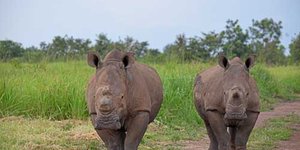Like this article?
Go on, give it a kudu!

Published on May 29 2013
Written by:
Jill W.
1228 views
A commonly asked question about a safari tour is what will the food be like. This is especially important if one is on a special diet, as many times such specifications to the menu are not as common in Africa as at home. The good news is that the majority of special diets on safari can readily be accommodated with advance notice. The advance notice is important, so that the proper ingredients can be acquired for you, especially in remote locales.
A typical safari menu for a day may look like this, but can vary greatly depending on the luxury level of safari:
Breakfast: Coffee, tea, porridge, fresh fruits (particularly melon, mango, bananas, etc), fruit juice, scrambled eggs/omelet, sausage, toast, margarine, honey, jam.
Lunch: Hot tea, coffee, sandwiches and wraps, fresh soups, local grains and pulses, biscuits, chips, fresh fruits and vegetables.
Dinner: Soup/stew, cooked meat or vegetarian meal (these include chicken/beef/goat with rice or maize, sliced fresh carrots and green beans, mashed potatoes, salads), fruits, fruit juice and variety of hot drinks.
Meals that are served either in a buffet or family style allow you to readily choose the items you wish to eat and skip the rest. For higher-end private tented lodges, you will have a choice of items and can be a bit more fussy. To ensure your dietary needs are met, the best advice is to let the kitchen know a day in advance so they can source any ingredients they may not have on-hand.
Carbohydrates are usually plentiful, but easily avoided. Protein is usually meat, but vegetarian meals can be arranged. Vegan meals are also possible, however you may need to be a bit proactive and educate your hosts on what is included in your diet and what is not. Diabetic meals are also commonly prepared by request.
Food allergies are bit trickier, and if you are allergic to several ingredients, you may wish to carry some supplemental snacks on your person. Depending on country, kosher and halal may not be as commonplace or easy to accommodate. However, in some countries with a large Muslim population, like Tanzania, halal is quite easy to accommodate. If you have a kosher or halal requirement, it is important that you mention this upfront as it may not always be possible on a given itinerary, especially at tented camps and remote lodges.
Has been on: 0 safaris
I like to 'do it myself' to feel like I'm truly traveling. It's my love of preparation and details that led me to work in the travel industry. After a dozen years in retail sales and agency management, I'm now a certified tour guide, based out of Portland, Oregon. My previous position was in safari sales and involved writing and marketing as well. Thus, I've also transitioning into travel writing, and safaris is indeed a topic I know well!
© Your African Safari Ltd, All rights reserved.
Your African Safari is a safari-planning and safari review site. It was created to help support a healthy African wildlife population. All reviews are vetted before being approved and only ethical tours are published

Garamba National Park—an anchor of hope in the Democratic Republic of Congo
Published on January 09 2025
By: R.W.

Namibia imposes new visa requirements
Published on July 25 2024
By: yourafricansafari.com

Do I really need travel insurance or travel protection for my safari?
Published on July 30 2024
By: yourafricansafari.com